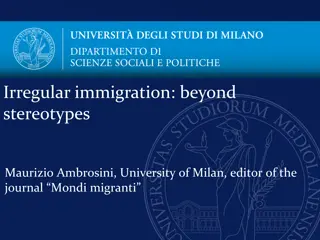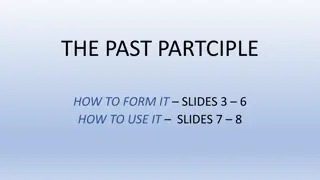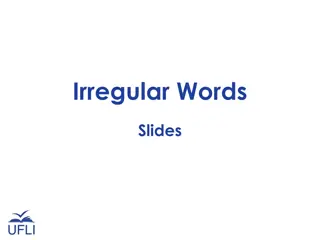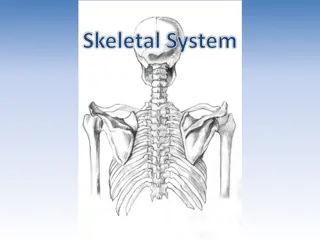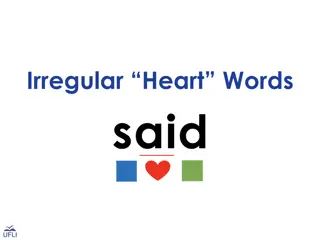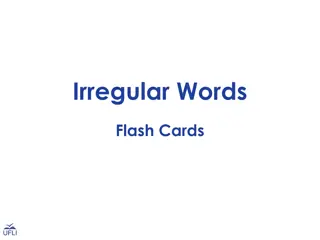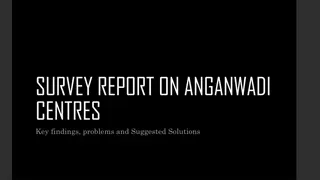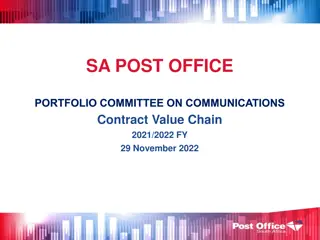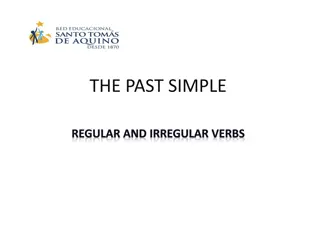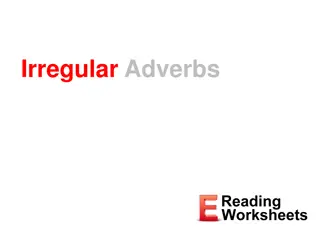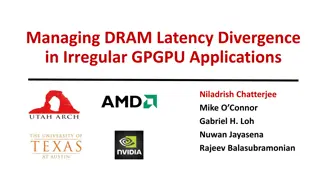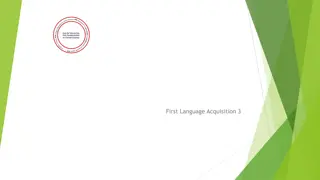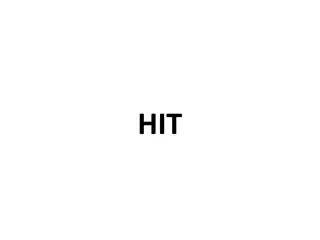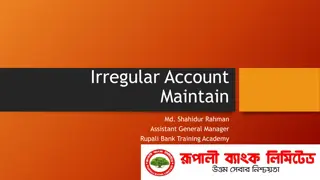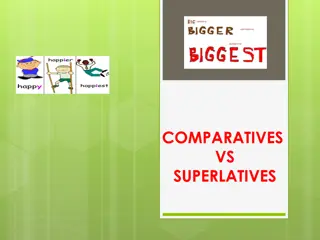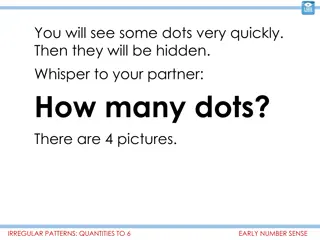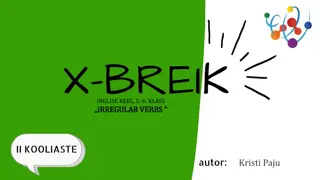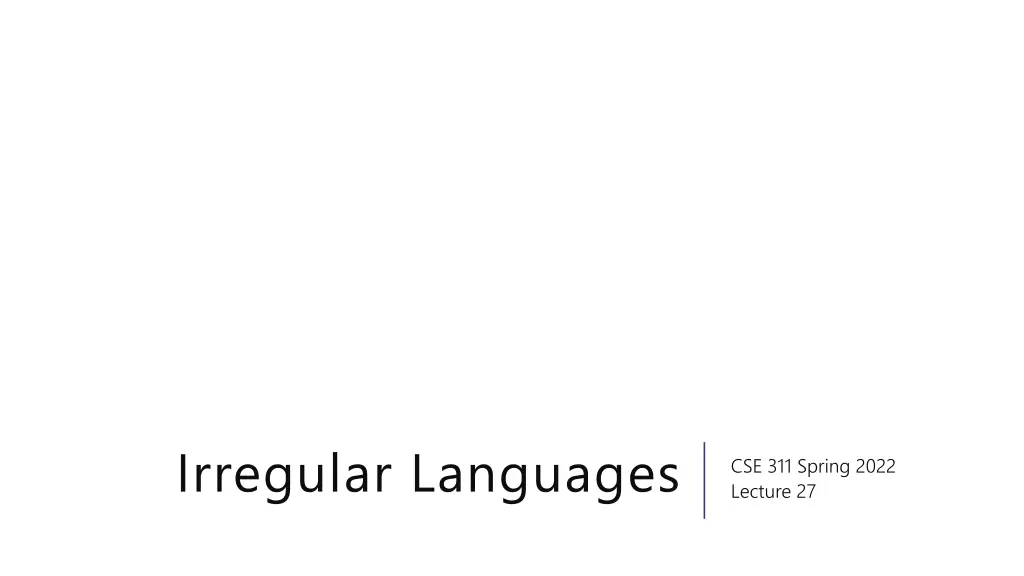
Understanding Irregular Languages and Proof Techniques in CSE
Explore the concept of irregular languages in the context of NFAs, DFAs, and Regexes, alongside proof techniques to demonstrate the limitations of DFAs. Discover how to prove an irregular language by contradiction, showcasing the inherent challenges in designing deterministic finite automata.
Download Presentation

Please find below an Image/Link to download the presentation.
The content on the website is provided AS IS for your information and personal use only. It may not be sold, licensed, or shared on other websites without obtaining consent from the author. If you encounter any issues during the download, it is possible that the publisher has removed the file from their server.
You are allowed to download the files provided on this website for personal or commercial use, subject to the condition that they are used lawfully. All files are the property of their respective owners.
The content on the website is provided AS IS for your information and personal use only. It may not be sold, licensed, or shared on other websites without obtaining consent from the author.
E N D
Presentation Transcript
Irregular Languages CSE 311 Spring 2022 Lecture 27
What cant NFAs/DFAs/Regexes do? There are languages that can t be recognized by a DFA. {0?1?|? 0} is the classic example. Let s prove it.
{0?1?|? 0} is not regular Not a proof: {0?1?|? 0} is regular if and only if there s a DFA the recognizes it. To know if the number of 0 s is equal to the number of 1 s that DFA is going to have to count that number ?. But that number could be arbitrarily big. And we have some finite number of states less than that. So it s not regular! the DFA must work like this isn t a rigorous argument.
The DFA must do this Consider The set of all binary strings, where the number of 01 substrings is equal to the number of 10 substrings. The DFA must count the number of 01 and 10 substrings, right? NO! Between every 01 substring there s a 10 substring. 0001111000011101011 You don t have to count the total, just the difference between them. And that difference never exceeds 1.
In general Try to avoid saying in order to solve problem X, a machine must do Y It s almost impossible to rigorously justify. And it s easy to trick yourself you ll have to argue no one is more clever than you are. The right way to argue around this claim is to argue by contradiction. Show that every conceivable DFA does the wrong thing (rather than indirectly that they aren t doing what you think they should).
A Proof Outline Claim: 0?1?:? 0 is an irregular language. Proof: Suppose, for the sake of contradiction, that {0?1?:? 0} is regular. Then there is a DFA ? such that ? accepts exactly {0?1?:? 0}. We want to show ?doesn t How do we do that? doesn t actually accept 0?1?:? 0
Forcing a Mistake We don t know anything about the DFA. Well except that it is is a DFA. So it is deterministic. I.e. if you re in a particular state and you read a certain character there s only one place to go. It s also finite. I.e. there are not an infinite number of states.
Forcing a Mistake What if We could find a set of strings that all must Too many of them. Enough that two must be in the same state. must be in different states. How would we know two strings have to be in different states? How many strings is enough? infinity
Forcing a Mistake How do we know ?,? must be in different states? Well if one would be accepted and the other rejected, that would be a clear sign. Or if there s some string ? where ?? is accepted but ?? is rejected (or vice versa). The machine is deterministic! If ? and ? take you to the same state, then ?? and ?? are also in the same state!
A Proof Outline Claim: 0?1?:? 0 is an irregular language. Proof: Suppose, for the sake of contradiction, that {0?1?:? 0} is regular. Then there is a DFA ? such that ? accepts exactly {0?1?:? 0}. We want to show ?doesn t How do we do that? doesn t actually accept 0?1?:? 0
A Proof Outline Claim: 0?1?:? 0 is an irregular language. Proof: Suppose, for the sake of contradiction, that {0?1?:? 0} is regular. Then there is a DFA ? such that ? accepts exactly {0?1?:? 0}. Let ? = [TODO]. S is an infinite set of strings. Because the DFA is finite, there are two (different) strings ?,? in ? such that ? and ? go to the same state. We don t get to choose ?,? Consider the string ? =[TODO] We do get to choose ? depending on ?,?
A Proof Outline Claim: 0?1?:? 0 is an irregular language. Let ? = [TODO]. S is an infinite set of strings. Because the DFA is finite, there are two (different) strings ?,? in ? such that ? and ? go to the same state. We don t get to choose ?,? Consider the string ? =[TODO] We do get to choose ? depending on ?,? Since ?,? led to the same state and ? is deterministic, ?? and ?? will also lead to the same state ? in ?. Observe that ?? {0?1?:? 0} but ?? {0?1?:? 0}. Since ? is can be only one of an accept or reject state, ? does not actually recognize {0?1?:? 0}. That s a contradiction! Therefore, {0?1?:? 0} is an irregular language.
Filling in the blanks Need ? Such that 1. ? is infinite 2. For every pair of strings ?,? in ?, there is a suffix ? such that one of ??,?? is in the language and the other is not in the language. Let ? = {0?:? 0} ? = 0?, ? = 0? with ? ?. Take ? = 1?.
Claim: 0?1?:? 0 is an irregular language. Proof: Suppose, for the sake of contradiction, that {0?1?:? 0} is regular. Then there is a DFA ? such that ? accepts exactly {0?1?:? 0}. Let ? ={0?:? 0}. Because the DFA is finite and ? is infinite, there are two (different) strings ?,? in ? such that ? and ? go to the same state when read by ?. Since both are in ?, ? = 0? for some integer ?, and ? = 0? for some integer ?, with ? ?. Consider the string ? = 1a. ?? = 0?1? {0?1?:? 0} but ?? = 0?1? {0?1?:? 0}. Since ?,? both end up in the same state, and we appended the same ?, both ?? and ?? end up in the same state of ?. Since ?? 0?1?:? 0 and ?? 0?1?:? 0 , ? does not recognize 0?1?:? 0 . But that s a contradiction! So 0?1?:? 0 must be an irregular language.
Full outline 1. Suppose for the sake of contradiction that ? is regular. Then there is some DFA ? that recognizes ?. 2. Let ? be [fill in with an infinite set of prefixes]. 3. Because the DFA is finite and ? is infinite, there are two (different) strings ?,? in ? such that ? and ? go to the same state when read by ?[you don t get to control ?,? other than having them not equal and in ?] 4. Consider the string ? [argue exactly one of xz,yz will be in L] 5. Since ?,? both end up in the same state, and we appended the same ?, both ?? and ?? end up in the same state of ?. Since ?? ?and ?? ?, ? does not recognize ?. But that s a contradiction! 6. So ? must be an irregular language.
Practical Tips When you re choosing the set ?, think about what the DFA would have to count That is fundamentally why a language is irregular. The set ? is the way we prove it! Whatever we need to remember it s different for every element of ?. If your strings have an obvious middle (like between the 0 s and 1 s) that s a good place to start.
Lets Try another The set of strings with balanced parentheses is not regular. What do you want ? to be? What would you have to count? The number of unclosed parentheses. Let ? =
Lets Try another The set of strings with balanced parentheses is not regular. What do you want ? to be? What would you have to count? The number of unclosed parentheses. Want ? to be a set with infinitely many strings with different numbers of unclosed parentheses. Let ? = (*
Outline for ( 1. Suppose for the sake of contradiction that ? is regular. Then there is some DFA ? that recognizes ?. 2. Let ? be (* 3. Because the DFA is finite and ? is infinite, there are two (different) strings ?,? in ? such that ? and ? go to the same state when read by ?Observe that ? = (? for some integer ?, ? = (b for some integer ? with ? ?. 4. Consider the string ? [argue exactly one of xz,yz will be in L] 5. Since ?,? both end up in the same state, and we appended the same ?, both ?? and ?? end up in the same state of ?. Since ?? ?and ?? ?, ? does not recognize ?. But that s a contradiction! 6. So ? must be an irregular language.
Full outline 1. Suppose for the sake of contradiction that ? is regular. Then there is some DFA ? that recognizes ?. 2. Let ? be (* 3. Because the DFA is finite and ? is infinite, there are two (different) strings ?,? in ? such that ? and ? go to the same state when read by ?Observe that ? = (? for some integer ?, ? = (b for some integer ? with ? ?. 4. Consider the string ?=)??? is a balanced set of parentheses (since there are the same number of each and all the open-parentheses come before the close parentheses). But ?? is not balanced because ? ?. 5. Since ?,? both end up in the same state, and we appended the same ?, both ?? and ?? end up in the same state of ?. Since ?? ?and ?? ?, ? does not recognize ?. But that s a contradiction! 6. So ? must be an irregular language.
One more, just the key steps What about {??????:? 0}?
One more, just the key steps What about {??????:? 0}? ? = {??:? 0} or ? = {????:? 0} are equally good choices. Your suffix is ???? for the first and ?? for the second. ? = {???:? 0} also works. ? = ?? 1?? is your suffix. The proof is a little more tedious, but you can make it through.
One Last Fun Fact On HW8, the extra credit is to use the pumping lemma to prove a language is irregular. The method from lecture always works i.e. for every non-regular language, you can write a proof like this. For the pumping lemma that isn t true there are some non-regular languages that satisfy the pumping lemma, which is why we don t focus on it. The final common way to show languages are regular or not regular is closure properties operations that (when applied to regular languages) always give you another regular language. Or vice versa.

